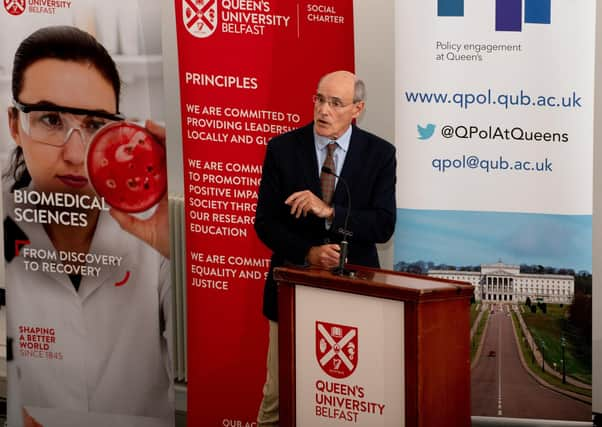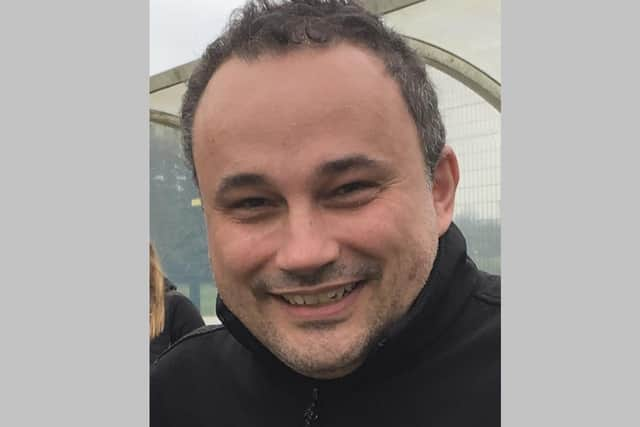Ian Parsley: Re-opening the health service is the single most important aspect of coming weeks, as urgent as the economy


However, this requires a balance between the understandable priority to maximise capacity for managing Covid-19 itself with the ongoing need to manage other diseases and conditions, which can themselves be life-limiting without the intervention and treatment of health professionals.
The biggest challenge to the health service was not preparing to save lives during Covid-19, but to save lives in its aftermath.
Advertisement
Hide AdAdvertisement
Hide AdAmid the broad discussion of re-opening the economy, we have missed the single most important aspect of the next few weeks — how we re-open our health service.


Studies in the UK reported by the BBC show the decision to suspend cancer screening for the duration of the coronavirus crisis may mean as many as 100 people in Northern Ireland each week are not being diagnosed for cancer; studies from Germany show that people are not reporting to hospital even with mild heart attacks, which are therefore going untreated.
The evidence is that this alone will result in years of lost life, as treatment in either case begins later than it would otherwise.
There are also questions also about when and how the treatment of long-term conditions will be restored.
Advertisement
Hide AdAdvertisement
Hide AdDiabetes is itself a significant risk with COVID-19, but is no longer being dealt with through face-to-face contact. Some Parkinson’s specialists (both in nursing and movement disorder) have been formally redeployed, leaving some people living with Parkinson’s with only background support.
From kidney disease to dementia, direct support has been postponed or temporarily removed, with consequences which are hard to calculate. Basic but vital interventions such as physiotherapy are only available remotely (making them practically unavailable for many).
Most people are understanding of why this must be, but it does raise the question of how we restore these services and make up for lost time and treatment.
There is also what has been described by experts at the Institute for Healthcare Improvement as the potential for a ‘Mental Health Pandemic’ — an appalling spiral where a combination of loneliness, uncertainty about the future and loss of livelihood combine to cause hugely elevated rates of anxiety and trauma.
Advertisement
Hide AdAdvertisement
Hide AdThe immediate issue concerns domestic violence and child abuse, which is much harder to measure without health visitors and social workers being able to check a residence or look out for well-being at school.
Calls to helplines have risen by half, and it is appropriate that Northern Ireland is currently urgently considering a Domestic Abuse and Family Proceedings Bill.
This broad social trauma — from the social isolation to the loss of livelihood — will stay with us for years and will have an impact on well-being for decades.
Tackling that trauma will require a fundamental mainstreaming of mental well-being in public policy, to stop it leading not only to longer term mental disorders but also (as studies show it does even in relatively mild economic downturns) to a rise in chronic conditions arising from increased levels of obesity or smoking, with consequent reduction in life expectancy associated with these.
Advertisement
Hide AdAdvertisement
Hide AdAll of this — the need for early diagnosis, to treat long-term conditions, and to mainstream mental well-being — must also be combined with the likely ongoing need for tertiary care for COVID-19 itself, whose side effects we still do not fully understand.
It is a complex and gloomy picture, so is there any room for optimism?
What all of this will do is reinforce the need for urgent reform of health and social care in Northern Ireland.
Where German-speaking Europe has led the way in the West on tackling the new coronavirus has been in its recognition that the virus needs to be understood and interventions made early to break the chains of infection - in other words, it has a health system build on preparedness (diagnostics and research), not just response (management and treatment).
Advertisement
Hide AdAdvertisement
Hide AdThis is exactly what Professor Rafael Bengoa envisages in ‘Systems not Structures’ — a health service built on systems designed to prepare (and intervene early), rather than on structures primarily designed to respond (and treat later).
So, what do we do now?
In the immediate term, we face the challenge of charting our way out of lockdown safely.
Lockdown was a necessary move to buy time and gain understanding, and there is a strong case for its maintenance while improved testing and tracing is developed. However, it is not even a medium-term policy option anywhere.
Extended families cannot remain separated for much longer; friends cannot be kept from meeting all summer; schools cannot realistically remain closed beyond August; even leisure activities cannot be put on hold indefinitely.
Advertisement
Hide AdAdvertisement
Hide AdMost immediately, however, our health service has to return to providing the universal care for which it was established and is renowned.
The toll on our collective mental health alone is already difficult to contemplate; once you add in the missed cancer diagnoses, the lost treatment and the delayed care, and the case against long-term lockdown is beyond dispute on health grounds alone.
That must now be the priority.
As we do re-open our health system, we should also remember there is always hope. That hope is that this crisis will speed up the much needed transformation of our health and social care services so that they are better placed to intervene earlier and improve our overall health and well-being faster in the very near future.
That would be a significant benefit to come out of perhaps the most challenging period of our lifetimes.
• Ian Parsley is a researcher for the Alliance Party and he blogs on public policy, latterly writing extensively on Covid-19